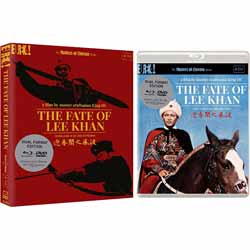|
Click here to return to the main site. Blu-ray Review
Wuxia or "martial heroes" (wǔ 武: literally "martial", "military", or "armed" and Xiá 俠: "chivalrous", "vigilante" or "hero/heroine") spring from ancient Chinese tradition and have infiltrated and conquered such diverse forms as opera, films, television series, books, comics and video games all around the world. The hero can be a swordsman or swordswoman even though they may not wield a sword. They are always outnumbered. They are always honourable. They always win, even if they die. Joseph Campbell includes wuxia as archetypal charter members of his universal Hero With A Thousand Faces (amazon.co.uk). Wuxia protagonists more often than not are outsiders, do not serve a lord (and if they do, their lord is under attack or dead,) do not wield official military power or belong to the aristocratic class. Often they originate from the lower class (like Mockingjay) or the working class (like Ripley in the Alien saga) with an innate code of chivalry, or integrity, something our world is starved of, to redress wrongs, topple oppressors and bring retribution for past misdeeds. Just like the Grecian goddess Nemesis. Clint Eastwood would have no career without wuxia, nor would Quentin Tarrantino, Agatha Christie, Arthur Conan Doyle, Ian Fleming, Georges Simenon, Zane Grey, Leslie Charteris, Edgar Rice Burroughs, Homer, Joe Schuster & Jerry Siegel, Bob Kane or The Apostle Paul. Olympian director King Hu is the emperor of wuxia. The final film in his "Inn Trilogy", and as Eureka educates discerning cinephiles: "the follow-up to his highly-acclaimed A Touch of Zen. The Fate of Lee Khan once again shows the master filmmaker’s impeccable talent in creating drama out of a single setting," (a "hangout", often a saloon or inn, but it can be a temple or monastery). "An espionage thriller with a unique wuxia twist and shades of Kurosawa’s Seven Samurai," (or Yojimbo) "the film chronicles a tense showdown between warriors on opposing sides of a civil war in a rural inn." "When Lee Khan (Tien Feng; A Better Tomorrow, Fist of Fury) a dangerous and cunning Mongol official, and his equally deadly sister Lee Wan-erh (Hsu Feng from A Touch of Zen), arrive at the Spring Inn to obtain a battle map that reveals the location of the Chinese rebel army, a group of resistance fighters, including an all-female group of ex-convicts plan to recapture the map, whatever the cost." "As much a pre-cursor to the ‘hangout’ movie as this is an action packed wuxia adventure, The Fate of Lee Khan features kinetic choreography by Sammo Hung (Eastern Condors) and also stars the incredible Angela "Lady Whirlwind" Mao, The Masters of Cinema Series is proud to present King Hu’s The Fate of Lee Khan on Blu-ray and DVD for the first time in the UK, from a new 2K restoration." I’ve quoted Eureka at length here to emphasize, 1.) their genuine love of film (if the pristine perfection of this restoration plus bountiful special features that will make you an inspired expert on wuxia if you’re not already, then nothing I can say will convince you - and 2.) to indicate to the WOKE generation that strong female heroes have been with us forever courtesy of wuxia. Dickhead Hollywood has tried hard recently with spectacular femme flops, we won’t mention here but to illustrate H-Town’s abject wuxia illiteracy, Tarrantino excluded, of course. The Fate of Lee Khan is a doctoral thesis in action, drawing on the genius of the immortal Sammo Hung. Whether the action is one on one or battle en masse, the choreography is beauty to behold. Just because this movie was made in 1973 doesn’t mean it isn’t as good as more recent attempts in the genre. It is embarrassingly better. Every collector of the art of action, the ballet of battle needs this film in his or her library. Beware of that all female cadre of convicts dedicated to recapturing the map, "whatever the cost." 10 John Huff Buy this item online
|
|---|

